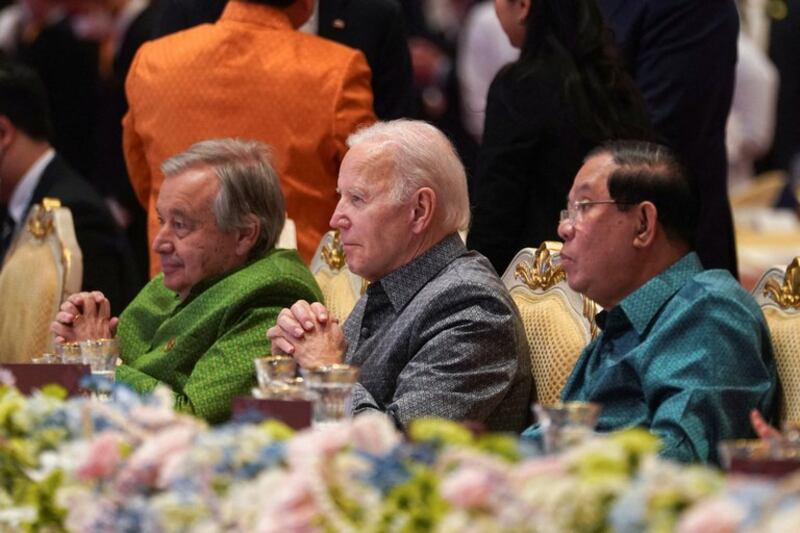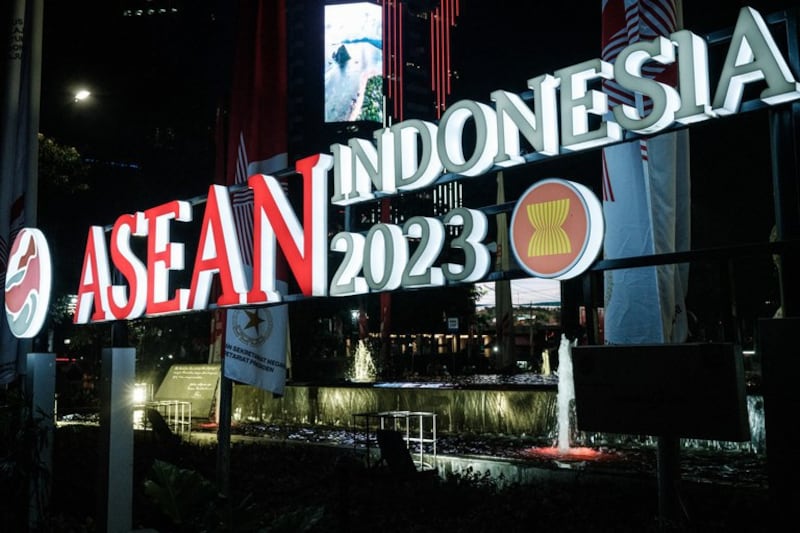Observers are casting doubt on Washington’s repeated commitments to Southeast Asia after the White House announced that President Joe Biden would skip the ASEAN summit in Jakarta next month and send his vice president instead.
Biden will be traveling to Asia in early September to attend the Group of Twenty (G20) meeting in New Delhi, but his missing the the Southeast Asian summit on Sept. 5-7 may signal the U.S. doesn’t believe that so-called “ASEAN centrality” helps counter China’s outsized influence in the region, some analysts said.
However, the American president may not be ignoring the region entirely, as the scuttlebutt in Washington is that he will very likely go to Hanoi instead to upgrade U.S. ties with Vietnam, a useful regional ally at a time of rising tensions with China.
But showing up at a gathering has its own merits and must not be underestimated, analysts said.
“Personal presence and relations among leaders and diplomats still matter in foreign policy,” Muhammad Waffaa Kharisma, of the Center for Strategic and International Studies in Jakarta, told BenarNews.
“The U.S. commitment to Southeast Asia has been repeatedly questioned. People are contrasting Biden’s attendance at other forums or summits with close friends such as Japan and South Korea with his no-show at ASEAN.”
Muhammad Waffaa also noted that some countries such as the Philippines – a longtime ally of the U.S. – had received their own reassurances of Washington’s support.
The White House, for its part, defends Biden’s Southeast Asia engagement as more than robust.
The U.S. has built strong ties and alliances from Northeast Asia to the Philippines to Australia, and has partnered with India and worked with ASEAN, National Security Advisor Jake Sullivan said Tuesday. The president had also sent Vice President Kamala Harris to Southeast Asia twice, Sullivan noted.
“I would put our record of achievement and engagement in the Indo-Pacific up against any American president and any other country in the world in the past two and a half years,” he told reporters in a conference call.
Biden met with his Japanese and South Korean counterparts last week at Camp David, the presidential retreat in Maryland, to expand security and economic ties.
In a joint statement, the three leaders said they “wholeheartedly affirm ASEAN centrality and our support for the ASEAN-led regional architecture.”
They also noted “dangerous and aggressive behavior” by China to support its “unlawful maritime claims” in the disputed South China Sea, and said they opposed actions that go against a rules-based international order.
Four of the 10 ASEAN members – Brunei, Malaysia, the Philippines and Vietnam – have overlapping claims with those of China’s expansive ones in the South China Sea. Indonesia doesn’t regard itself as party to the South China Sea dispute, but Beijing claims historic rights to parts of that sea overlapping Indonesia’s exclusive economic zone.

Recognizing overlapping interests, Biden set out to alter predecessor Donald Trump’s Southeast Asian strategy – Trump only attended one ASEAN summit, in 2017 in Manila, during his time in office (2017-2021).
Biden attended the ASEAN-U.S. and East Asia summits in Phnom Penh last November, when Cambodia was the 2023 chair of the Southeast Asian bloc. He also attended the same annual summits virtually in 2021 amid the COVID-19 pandemic. And in May last year, the U.S. president hosted a U.S.-ASEAN Special Summit in Washington.
In addition, he unveiled the Indo-Pacific Economic Framework in an effort to counter Beijing's gigantic economic influence in Southeast Asia, although the program has many detractors.
‘Just plain stupid’
Biden should have kept that momentum going, indicated Jeffrey D. Bean, of the Observer Research Foundation America, on the social media platform X, formerly called Twitter.
“Every time you think the Biden administration has it together on Asia policy, they go and do something like this. Just plain stupid for Biden to skip [the East Asia Summit] and the U.S.-ASEAN summit,” he said.
Skipping an event such as the ASEAN summit and the East Summit, which are held concurrently, will make it seem that Washington is saying one thing and doing another, wrote Zack Cooper, a senior fellow at the American Enterprise Institute, in a commentary for the Texas National Security Review.
“If trends continue, foreign leaders could come to believe that public opposition to China is the litmus test for consequential U.S. engagement,” Copper said.
“U.S. leaders appear to have a two-tiered regional approach: ambitious engagement with countries that are openly balancing against China, but limited time for those countries that prefer to hedge. In short, Biden is investing in the balancers but not the hedgers.”
China is often accused of transactional relationships, and the U.S. should be careful to not appear to be doing the same, Cooper said.
Side trip to Hanoi?
Yet, Biden’s potential Vietnam trip would show quite the opposite, said Alexander Vuving, professor at the Asia-Pacific Center for Security Studies in Honolulu, in a post on X.
“Biden’s absence from the ASEAN meeting raises questions about U.S. commitment to ASEAN (centrality) for sure, but [it] doesn’t mean the U.S. is less committed to Southeast Asia. Instead of going to Indonesia, he is planning to go to Vietnam, to raise bilateral ties to the strategic level,” he said.

And as Peter Mumford of the geopolitical risk firm Eurasia Group noted, “Xi Jinping rarely attends ASEAN summits either, sending [his] premier instead.”
Biden isn’t ignoring Southeast Asia or the Asia-Pacific region, he is just not relying solely on ASEAN for his regional strategy, Vinsensio Dugis, the director of the ASEAN Studies Center at Airlangga University in Surabaya, pointed out.
Biden is using mechanisms such as AUKUS, a security pact with Australia and Britain; QUAD, a grouping of four democracies with India, Japan and Australia; and APEC, a forum for 21 economies bordering the Pacific Ocean, to pursue Washington’s Indo-Pacific strategy, Vinsensio said.
Besides, U.S. Vice President Kamala Harris, a person of Asian descent, could bring a different perspective to regional issues such as climate change, trade and security, he said.
“We still need to see what issues she brings and how she delivers them during the ASEAN summit,” he said.
Radio Free Asia (RFA) correspondent Alex Willemyns contributed to this report by BenarNews, an RFA-affiliated online news organization.
